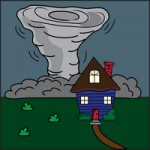 The thought of reading through your insurance policy might seem like the ultimate cure for insomnia. The legalese and insurance industry terms simply might be too opaque for most people to easily make their way through.
The thought of reading through your insurance policy might seem like the ultimate cure for insomnia. The legalese and insurance industry terms simply might be too opaque for most people to easily make their way through.
Sometimes, though, it’s worth the effort of reading all the “fine print.” In many cases, some of the most important elements of your insurance coverage are located in the riders and other less conspicuous areas of your written policy.
Here is some advice on many of the confusing insurance policy terms, and how and what to look for in your insurance policies.
Uninsured motorist coverage
One of the finer points of your automobile insurance is the option to choose “uninsured motorist coverage.” Most states have laws that require every driver to have up-to-date insurance coverage whenever they operate an automobile. In practice, of course, this isn’t always the case, and people without automobile insurance do drive cars and get into accidents.
When uninsured motorists cause accidents, they don’t have insurance to cover the damages, so the innocent parties often have to pay for the damages done to them (the uninsured can be sued of course, but many times individuals who don’t have insurance won’t have any funds to pay for the damages they cause). A standard auto insurance policy probably won’t include this type of coverage, so if you wanted to protect yourself from this type of damage you would need to purchase a separate rider to your standard polity.
Health Care Coverage
The “fine print” can be significant when considering health insurance coverage. There is a great range in the types of coverage that are provided from one health insurance company to another. For example, some insurance companies will cover alternative health treatments (like therapeutic massage, for example), while others will not.
Payouts and Exclusions
The “fine print” of life insurance policies may exclude payouts for certain types of events. The most common of these is an exclusion for certain voluntary and “high risk” activities (skydiving is usually included in the list of activities).
Natural Disasters
When you review your homeowners’ insurance, there are a couple of significant points in the fine print that you should look for. First, check the scope of coverage for natural disasters and weather-related damages. Are there any limits or specific definitions that could affect your coverage? For example, if you live in the gulf coast area, does your hurricane coverage include the flood damage that could occur with the storm surge?
Market or Replacement Value
The details of your homeowners’ policy will state whether your coverage is for the “market value” of your home, or the “replacement value.” These are two values are usually not the same thing, and in many areas of the country, with falling real estate markets, the difference between the two amounts have never been greater.
“Replacement value” is how much it would cost to rebuild your house from the ground up, whereas “market value” is a measure of what it would cost to purchase your house (or one very similar to it) in the local real estate market.
The problem for many homeowners is that the market value of their homes may have fallen in recent years, even though the cost to actually replace the home has not fallen (or may actually have gone up). This is particularly true where a homeowner has made improvements to their home – like a new kitchen or finished basement or landscaping, and these improvements have not led to a corresponding increase in the home’s market value.
Reviewing the details of your insurance coverage might not be the most exciting thing in the world, but it could eventually end up saving you thousands of dollars in unintended costs or unexpected coverage gaps.
Tags: catastrophic coverage, insurance advice, insurance exclusions
This entry was posted
on Wednesday, December 15th, 2010 at 8:01 am and is filed under Auto.
You can follow any responses to this entry through the RSS 2.0 feed.
You can leave a response, or trackback from your own site.
 The thought of reading through your insurance policy might seem like the ultimate cure for insomnia. The legalese and insurance industry terms simply might be too opaque for most people to easily make their way through.
The thought of reading through your insurance policy might seem like the ultimate cure for insomnia. The legalese and insurance industry terms simply might be too opaque for most people to easily make their way through.











